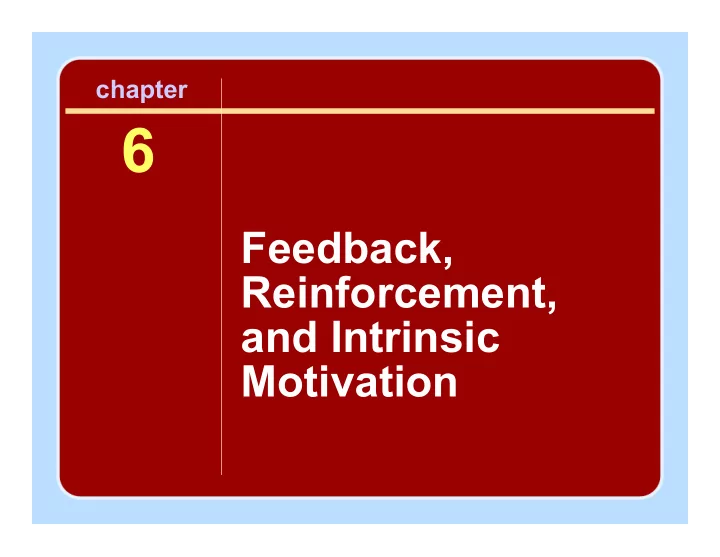

chapter 6 Feedback, Reinforcement, and Intrinsic Motivation
Session Outline (continued) • Intrinsic Motivation and Extrinsic Rewards • Cognitive evaluation theory • How extrinsic rewards affect intrinsic motivation in sport • Increasing intrinsic motivation
Intrinsic & Extrinsic Motivation • Intrinsic: Performing an activity for itself and the pleasure and satisfaction derived from participation • Extrinsic: Engaging in an activity as a means to an end and not for its own sake
Understanding Feedback and Reinforcement What is reinforcement? The use of rewards and punishment that increase or decrease the likelihood of a similar response occurring in the future
Principles of Reinforcement • If doing something results in a good consequence (such as being rewarded), people tend to repeat the behavior to achieve additional positive reinforcement. • If doing something results in an unpleasant consequence (such as being punished), people tend not to repeat the behavior to avoid more negative consequences.
Approaches to Influencing Behavior Positive approach Focuses on rewarding appropriate behavior, which increases the likelihood of desirable responses occurring in the future Negative approach Focuses on punishing undesirable behaviors, which should lead to future redirection of these inappropriate behaviors
Punishment Punishment can control and change behavior, but 80% to 90% of reinforcement should be positive. Drawbacks of punishment • Punishment can arouse fear of failure. • Punishment can act as a reinforcer. • Punishment can create an unpleasant, aversive learning environment.
Modifying Behavior in Sport Behavior modification Systematic application of the principles of reinforcement to change behavior Contingency management = behavioral coaching = behavior modification
Intrinsic Motivation People who have intrinsic motivation strive inwardly to be competent and self- determining in their quest to master tasks.
Self-Determination Theory (SDT) “People are inherently motivated to feel connected…to function effectively…and to feel a sense of personal initiative” (Deci & Ryan, 1994) • Relatedness • Effectance • Autonomy
Cognitive Evaluation Theory (CET) • Events that effect people’s perception of competence & feelings of self-determination will affect their level of intrinsic motivation (Deci & Ryan, 1985) • Events = Distribution of rewards, feedback quantity & quality, the way situations are structured
Continuum of Intrinsic and Extrinsic Motivation (See figure 6.2 on page 140 of text.)
Intrinsic Motivation Knowledge, accomplishment, stimulation: “For the pleasure discovering new techniques” Identified Regulation Participation valued “Because it is a good even if activity is not way to maintain pleasant friendships” Introjected Regulation Internal pressures “Because I must do such as guilt. sports to feel good about myself” External Regulation Behavior controlled by “For the prestige of external sources such being an athlete” as reward & punishment. Amotivation Neither intrinsically or “I don’t care about extrinsically teaching any more” motivated.
Robert Vallerand • http://www.er.uqam.ca/ nobel/r26710/LRCS/ rjvaller_en.htm
Factors Influencing Intrinsic Motivation Social factors • Success and failure • Focus of competition • Coaches behavior Psychological factors • Need for competence • Need for autonomy • Need for relatedness
Intrinsic Motivation and Extrinsic Rewards • Basic question: Do extrinsic rewards undermine intrinsic motivation? • Research shows that being paid for working on an intrinsically interesting activity can decrease a person’s intrinsic motivation for the activity.
Intrinsic Motivation and Extrinsic Rewards Classic studies • Deci (1971, 1972): SOMA puzzles • Lepper and Greene (1975): Nursery school, expected and unexpected rewards
Intrinsic Motivation and Extrinsic Rewards Cognitive evaluation theory How rewards are perceived is critical in determining whether intrinsic motivation increases or decreases.
Cognitive Evaluation Theory (continued) Functional significance of the event How a reward affects intrinsic motivation depends on whether the recipient perceives it to be more controlling or more informational.
Cognitive Evaluation Theory Controlling aspects Rewards that are perceived to control a person decrease intrinsic motivation, whereas rewards that contribute to an internal locus of causality increase intrinsic motivation. Informational aspects Rewards that increase the information aspect and provide positive feedback about competence increase intrinsic motivation, whereas rewards that suggest the person is not competent decrease intrinsic motivation. (continued)
Controlling Aspect of A Reward Intrinsic Motivation Increases Decreases Cause of behavior lies Cause of behavior inside person outside person Perceived Locus of Causality Perceived Locus of Causality (Internal) (External)
Informational Aspect of A Reward Intrinsic Motivation Increases Decreases Increased perceived competence Decreased perceived competence Positive information Negative information of competence of competence
How Extrinsic Rewards Affect Intrinsic Motivation in Sport • Scholarships: Athletic scholarships can either decrease or increase athletes’ levels of intrinsic motivation, depending on which is more emphasized by the coach—the controlling or information aspects. (continued)
How Extrinsic Rewards Affect Intrinsic Motivation in Sport (continued) • Competitive success and failure: Competitive success tends to increase intrinsic motivation, whereas competitive failure tends to decrease intrinsic motivation. • Feedback: Positive feedback increases intrinsic motivation.
Other Determinants of Intrinsic Motivation Higher levels of intrinsic motivation are related to the following: • Playing for an autonomous (democratic) versus a controlling coach • Participating in a recreational versus competitive league • High versus low perceived competence • High versus low perceived control
Increasing Intrinsic Motivation • Provide for successful experiences. • Give rewards contingent on performance. • Use verbal and nonverbal praise. • Vary content and sequence of practice drills. • Involve participants in decisions. • Set realistic performance goals.
Flow: A Special Case of Intrinsic Motivation Flow A holistic, intrinsically motivating sensation that people feel when they are totally involved in an activity or are on “automatic pilot”
Recommend
More recommend